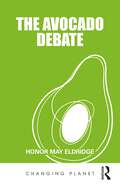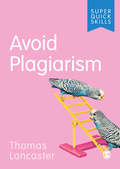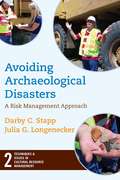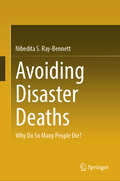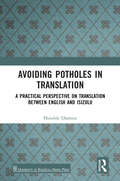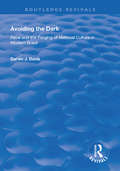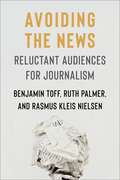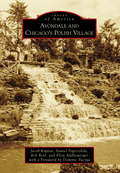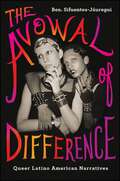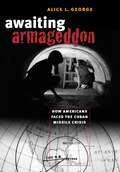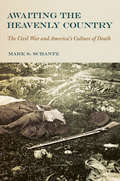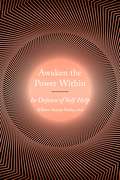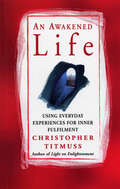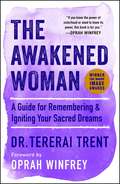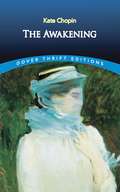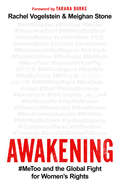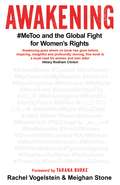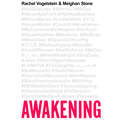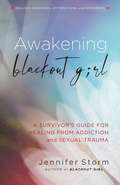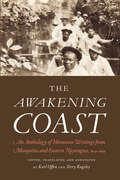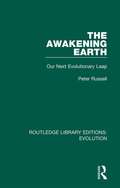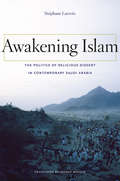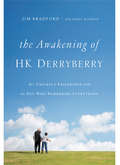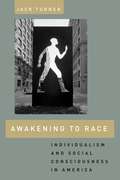- Table View
- List View
The Avocado Debate (Changing Planet)
by Honor May EldridgeWhether smashed on toast or hailed as a superfood, the avocado has taken the world by storm, but what are the environmental and social impacts of this trendy fruit? This book does not seek to demonise the avocado and its many enthusiasts. Instead, it will illuminate consumers on the often unseen impacts of foods. A staple of cafes, restaurants, homes, and social media channels, demand for the avocado has grown exponentially over the past thirty years. From an everyday crop in South and Central America to a global phenomenon, this drastic change in demand has many consequences for people and the planet. As demand grows, so does the need for more land, with land clearances threatening habitats and biodiversity. As production grows, so does global distribution and the impacts that air and sea travel have on the environment. The shift from a local to a global product disturbs the local food system, raising serious questions around food sovereignty and food justice and the importance of establishing an agricultural system that is both environmentally and socially just. While focusing here on the avocado, this book allows readers to gain a better understanding of the food system as a whole. In doing so, it empowers us all to think carefully and critically about the environmental and ethical implications of our food choices more broadly. We shouldn’t feel guilty about eating avocados, we should simply understand the impact of doing so. This book is essential reading for all who are interested in learning more about the food system, sustainable diets, and the relationship between farming and the environment.
Avoid Plagiarism (Super Quick Skills)
by Thomas LancasterNeed guidance on plagiarism and how to avoid it? Avoid Plagiarism makes understanding plagiarism simple, giving you the know-how to write confidently and independently. Get clear guidance on exactly what plagiarism is Learn how to avoid unintentionally plagiarising the work of others Find out how to correctly credit your sources. Super Quick Skills provide the essential building blocks you need to succeed at university - fast. Packed with practical, positive advice on core academic and life skills, you’ll discover focused tips and strategies to use straight away. Whether it’s writing great essays, understanding referencing or managing your wellbeing, find out how to build good habits and progress your skills throughout your studies. Learn core skills quickly Apply right away and see results Succeed in your studies and life. Super Quick Skills give you the foundations you need to confidently navigate the ups and downs of university life.
Avoiding Archaeological Disasters: Risk Management for Heritage Professionals (Techniques & Issues in Cultural Resource Management #2)
by Darby C Stapp Julia LongeneckerYou think it can’t happen to you, but it can. One day, months into your construction project, your front end load operator runs into bones and wooden slats. Your county coroner says it is not a crime scene, and refers you to the local archaeology department. The archaeologist tells you that it is a very important discovery. Work stops. Archaeological discoveries happen all the time in the course of projects. Most are manageable, some are less so, and some are mismanaged, wasting time and money. If you are not prepared, the consequences can be disastrous. This book is for project engineers, project managers, construction managers, the staff of affected government agencies, and archaeological consultants. In its pages you receive enough information, enough archaeological perspective, to intelligently work with the various parties involved in your project and avoid an archaeological disaster.
Avoiding Disaster Deaths: Why Do So Many People Die?
by Nibedita S. Ray-BennettThis book introduces a pathbreaking approach called &‘Avoidable Disaster Deaths&’ (ADD) to reduce disaster deaths. Disaster deaths are the direct and indirect impact of hazards. The &‘Sendai Framework for Disaster Risk Reduction&’ has urged the United Nations Member States to reduce disaster deaths or mortality by 2030. Reducing the number of disaster deaths has become a useful marker for improving disaster risk management. Equally important is knowing how people die, who dies, why they die, and which disaster deaths are &‘avoidable&’ and &‘unavoidable&’. Disaster risk reduction specialists have not fully examined these questions. Built from disaster risk reduction, public health, epidemiology, human geography, risk and crisis management studies, the ADD approach disaggregates disaster deaths into avoidable and unavoidable. Avoidable disaster deaths are preventable, amenable and governance-related. Unavoidable deaths are those that occur annually due to natural causes or poverty-related diseases. In a disaster climate, the emphasis should be on reducing avoidable disaster deaths in a resource-constrained context. Using the context of COVID-19 and the economic lockdown in India, the analytical advantage of this approach is explored. Doing so, the book brings forth human stories whose lives were cut short and introduces novel matrices and dynamic strategies to ascertain the &‘cause and circumstances&’ of avoidable disaster deaths to develop the capacity of disaster and health responders. The book is suitable for students, academics, policy-makers and practitioners interested in disaster risk reduction, human rights, risk and crisis management, environmental science, human geography, Sustainable Development and Sendai Goals. The book is also suitable for passionate citizens who want to capture the number, causes and circumstances of avoidable disaster deaths and take positive action to save lives in their communities. Professor Nibedita S. Ray-Bennett ably presents a novel &‘avoidable disaster deaths&’ approach to disaster risk reduction and management by presenting cogent arguments rooted in solid theory and up to date literature reviews, complemented by a wealth of data and analysis from the Indian Covid 19 experience. The book includes a range of tables and diagrams that crystallise approaches and practices useful for policy makers and practitioners alike. The book is highly informed, well written, accessible, practical and useful, with an optimal mix of strong, well-tested academic theory, and important recommendations that demand serious consideration by all involved and interested in disasters. A spur to action and inspiration. (Professor Michael Petterson, School of Social Sciences, Auckland University of Technology, New Zealand)
Avoiding Potholes in Translation: A Practical Perspective on Translation between English and isiZulu
by Phindile DlaminiThis book is a comprehensive introduction to translation studies between English and isiZulu. It incorporates crucial concepts for understanding the basics of translation within a South African language context and lays a foundation for further studies in translation. The book's content coverage, while broad, is also in-depth, and it skillfully integrates examples from varied types of texts. The practical and accessible style makes it both engaging and informative. The diverse examples illustrate not only the technicalities of translation as a process, but the vivid dynamics brought about by the fact that the languages involved in the translation process belong to different language families. The use of these examples for almost every aspect of translation explained makes this book unique and valuable to translation scholars and practitioners alike. Even though the book uses cases from the isiZulu language, it is an applicable reference for translation scholars and practitioners working with different indigenous languages of South Africa. Print edition not for sale in Sub Saharan Africa.
Avoiding the Dark: Essays on Race and the Forging of National Culture in Modern Brazil (Routledge Revivals)
by Darien J. DavisFirst published in 1999. This work examines the processes by which Brazilian nationalists forged and propagated an all-inclusive national identity, which attempted to promote racial harmony in the first four decades of the twentieth century. Specific emphasis is given to the rising patriotic feelings under the administration of President Getulio Vargas, which culminated in the creation of Estado Novo in 1937. Vargas’ generation succeeded in encouraging Brazilians to identify with ‘the nation’ above other possible communities, such as radical, ethnic or regional ones. In the process, nationalists created enduring national myths and symbols which successfully marginalised racial consciousness for the rest of the twentieth century.
Avoiding the News: Reluctant Audiences for Journalism (Reuters Institute Global Journalism Series)
by Benjamin Toff Ruth Palmer Rasmus Kleis NielsenA small but growing number of people in many countries consistently avoid the news. They feel they do not have time for it, believe it is not worth the effort, find it irrelevant or emotionally draining, or do not trust the media, among other reasons. Why and how do people circumvent news? Which groups are more and less reluctant to follow the news? In what ways is news avoidance a problem—for individuals, for the news industry, for society—and how can it be addressed?This groundbreaking book explains why and how so many people consume little or no news despite unprecedented abundance and ease of access. Drawing on interviews in Spain, the United Kingdom, and the United States as well as extensive survey data, Avoiding the News examines how people who tune out traditional media get information and explores their “folk theories” about how news organizations work. The authors argue that news avoidance is about not only content but also identity, ideologies, and infrastructures: who people are, what they believe, and how news does or does not fit into their everyday lives. Because news avoidance is most common among disadvantaged groups, it threatens to exacerbate existing inequalities by tilting mainstream journalism even further toward privileged audiences. Ultimately, this book shows, persuading news-averse audiences of the value of journalism is not simply a matter of adjusting coverage but requires a deeper, more empathetic understanding of people’s relationships with news across social, political, and technological boundaries.
Avondale and Chicago's Polish Village
by Elisa Addlesperger Rob Reid Jacob Kaplan Dan Pogorzelski Dominic PacygaHome to Chicago's Polish Village, impressive examples of sacred and industrial architecture, and the legendary Olson Waterfall, Avondale is often tagged as "the neighborhood that built Chicago." Images of America: Avondale and Chicago's Polish Village sheds light on the little known history of the community, including its fascinating industrial past. From its beginnings as a sleepy subdivision started by a Michigan senator, it became a cultural mecca for Chicago's Polish community, playing a crucial role in Poland's struggles for independence. Other people also called Avondale home, such as Scottish proprietors, African American freedmen, Irish activists, Swedish shopkeepers, German tradesmen, Jewish merchants, Filipino laborers, and Italian entrepreneurs; a diversity further enriched as many from the former Soviet Bloc and Latin America settled here. As in other Chicago neighborhoods, change is the one constant, as the arts have brought a renaissance to this working-class corner of the city.
The Avowal of Difference: Queer Latino American Narratives (SUNY series, Genders in the Global South)
by Ben. Sifuentes-JáureguiThe Avowal of Difference explores the potentialities and limitations that queer theory offers in the context of Latino American texts and subjects. Ben. Sifuentes-Jáuregui contrasts Latino American sexual genealogies with the Anglo-European "coming out" narrative—and interrogates the centrality of the "coming out" story as the regulating metaphor for gay, lesbian, or queer identities. In its place, the book looks at other strategies—from silence to circumlocution, from disavowal to indifference—to theorize queer subject formation in a Latino American cultural context. The analysis of texts by José Lezama Lima, Luis Zapata, Manuel Puig, Severo Sarduy, Junot Díaz, and others offers a comparative approach to understanding how queer sexualities are shaped and written in other cultural contexts.
Awaiting Armageddon
by Alice L. GeorgeFor thirteen days in October 1962, America stood at the brink of nuclear war. Nikita Khrushchev's decision to place nuclear missiles in Cuba and John F. Kennedy's defiant response introduced the possibility of unprecedented cataclysm. The immediate threat of destruction entered America's classrooms and its living rooms. Awaiting Armageddon provides the first in-depth look at this crisis as it roiled outside of government offices, where ordinary Americans realized their government was unprepared to protect either itself or its citizens from the dangers of nuclear war.During the seven days between Kennedy's announcement of a naval blockade and Khrushchev's decision to withdraw Soviet nuclear missiles from Cuba, U.S. citizens absorbed the nightmare scenario unfolding on their television sets. An estimated ten million Americans fled their homes; millions more prepared shelters at home, clearing the shelves of supermarkets and gun stores. Alice George captures the irrationality of the moment as Americans coped with dread and resignation, humor and pathos, terror and ignorance.In her examination of the public response to the missile crisis, the author reveals cracks in the veneer of American confidence in the early years of the space age and demonstrates how the fears generated by Cold War culture blinded many Americans to the dangers of nuclear war until it was almost too late.
Awaiting the Heavenly Country: The Civil War and America's Culture of Death
by Mark S. Schantz"Americans came to fight the Civil War in the midst of a wider cultural world that sent them messages about death that made it easier to kill and to be killed. They understood that death awaited all who were born and prized the ability to face death with a spirit of calm resignation. They believed that a heavenly eternity of transcendent beauty awaited them beyond the grave. They knew that their heroic achievements would be cherished forever by posterity. They grasped that death itself might be seen as artistically fascinating and even beautiful."-from Awaiting the Heavenly CountryHow much loss can a nation bear? An America in which 620,000 men die at each other's hands in a war at home is almost inconceivable to us now, yet in 1861 American mothers proudly watched their sons, husbands, and fathers go off to war, knowing they would likely be killed. Today, the death of a soldier in Iraq can become headline news; during the Civil War, sometimes families did not learn of their loved ones' deaths until long after the fact. Did antebellum Americans hold their lives so lightly, or was death so familiar to them that it did not bear avoiding?In Awaiting the Heavenly Country, Mark S. Schantz argues that American attitudes and ideas about death helped facilitate the war's tremendous carnage. Asserting that nineteenth-century attitudes toward death were firmly in place before the war began rather than arising from a sense of resignation after the losses became apparent, Schantz has written a fascinating and chilling narrative of how a society understood death and reckoned the magnitude of destruction it was willing to tolerate.Schantz addresses topics such as the pervasiveness of death in the culture of antebellum America; theological discourse and debate on the nature of heaven and the afterlife; the rural cemetery movement and the inheritance of the Greek revival; death as a major topic in American poetry; African American notions of death, slavery, and citizenship; and a treatment of the art of death-including memorial lithographs, postmortem photography and Rembrandt Peale's major exhibition painting The Court of Death. Awaiting the Heavenly Country is essential reading for anyone wanting a deeper understanding of the Civil War and the ways in which antebellum Americans comprehended death and the unimaginable bloodshed on the horizon.
Awaken the Power Within: In Defense of Self-Help
by Albert AmaoThe $12 billion self-help industry is under constant attack for pedaling false miracles to duped believers. But sociologist Albert Amao demonstrates that Americans eagerly support self-help books, seminars, and programs because, under the right conditions, these things work.Sociologist Albert Amao analyzes the accuracy of self-help and positive-thinking claims in this groundbreaking--and wholly unexpected--exploration of what works, what doesn't, and why. "Regarding my personal experience," Amao writes, "I can testify that positive thinking and positive action have worked wonderfully for me. Born in a poor Latin-American country into a very impoverished family with both parents practically illiterate, I was the oldest of five children. I started working when I was six years old, shining shoes and selling newspapers to help my family. Nobody then would have believed that I would be able to finish high school. Nevertheless, I was able to do it going to night school, which allowed me to be admitted at the San Marcos University in Lima to get my Ph.D. in sociology. All these things were possible because, when I was teenager, I had access to New Thought," or positive-thinking philosophy. Contrary to the critics who blithely dismiss self-help methods, or the New Age gurus who sell it them as miracles, Amao--writing with sobriety, scholarship, and drawing on deep personal experience--explores the conditions under which self-help is authentic.
An Awakened Life: Using Everyday Experiences for Inner Fulfilment
by Christopher TitmussIn an awakened life, our hearts are open, steady and purposeful. Most people today have a greater income, as well as more goods and labour - saving devices, than any other generation in history. Yet stress, discontent, personal and social problems abound. Drawing on the deepest discoveries of the Buddhist tradition, well-known retreat master, Christopher Titmuss, suggests we spend far too much time in superficial preoccupaions and not enough in looking deeply into things. He urges us to fearlessly transform the forces of desire and dissatisfaction that haunt our daily lives - and to awaken to the Immeasurable. Inspired by the 20th Century classic, Zend Mind, Beginner's mind, he gives practical advice on such subjects as: understanding our feelings , taking risks, becomming more detached and rediscovering our true selves. And he shows us how to have free, fulfilled and uninhibited lives amidst the frenzy of everyday activity.
The Awakened Woman: Remembering & Reigniting Our Sacred Dreams
by Oprah Winfrey Tererai TrentThrough one incredible woman’s journey from a child bride in a small Zimbabwe village to one of the world’s most recognizable voices in women’s empowerment and education, this manifesto inspires women to pursue their sacred dreams through nine essential lessons brought forth from ancient African wisdom.Before Tererai Trent landed on Oprah’s stage as her “favorite guest of all time,” she was a woman with a forgotten dream. As a young girl in a cattle-herding village in Zimbabwe, she dreamed of receiving an education but instead was married young and by eighteen, without a high school graduation, she was already a mother of three. Tererai encountered a visiting American woman who assured her that anything was possible, reawakening her sacred dream. Tererai planted her dreams deep in the earth and prayed they would grow. They did, and now not only has she earned her PhD but she has also built schools for girls in Zimbabwe, with funding from Oprah. The Awakened Woman: Remembering & Reigniting Our Sacred Dreams is her accessible, intimate, and evocative guide that teaches nine essential lessons to encourage all women to reexamine their dreams and uncover the power hidden within them—power that can recreate our world for the better. Tererai points out that there is a massive, untapped, global resource in women who have, for one reason or another, set aside their wisdom, their skills, and their dreams in order to take care of the personal business of their lives. Not only is this a type of invisible suffering experienced by countless women, this rich resource is a secret weapon for improving our world. Women have the capacity to inspire, to create, to transform—and Tererai’s call to action will awaken hearts, give permission to recapture dreams, and provide the tools to forge a brighter path for all. This is the movement of Sacred Sisters.
The Awakening: Spotlight Edition (Dover Thrift Study Editions)
by Kate ChopinWhen first published in 1899, The Awakening shocked readers with its honest treatment of female marital infidelity. <P><P>Audiences accustomed to the pieties of late Victorian romantic fiction were taken aback by Chopin's daring portrayal of a woman trapped in a stifling marriage, who seeks and finds passionate physical love outside the straitened confines of her domestic situation. <P>Aside from its unusually frank treatment of a then-controversial subject, the novel is widely admired today for its literary qualities. Edmund Wilson characterized it as a work "quite uninhibited and beautifully written, which anticipates D. H. Lawrence in its treatment of infidelity." <P>Although the theme of marital infidelity no longer shocks, few novels have plumbed the psychology of a woman involved in an illicit relationship with the perception, artistry, and honesty that Kate Chopin brought to The Awakening. <P>Now available in this inexpensive edition, it offers a powerful and provocative reading experience to modern readers.
Awakening: How Gays and Lesbians Brought Marriage Equality to America
by Nathaniel FrankSome of the most divisive contests shaping the quest for marriage equality occurred not on the culture-war front lines but within the ranks of LGBTQ advocates. Nathaniel Frank tells the dramatic story of how an idea that once seemed unfathomable—and for many gays and lesbians undesirable—became a legal and moral right in just half a century.
Awakening: #MeToo and the Global Fight for Women's Rights
by Meighan Stone Rachel B. VogelsteinForeword by Tarana Burke. Awakening chronicles the remarkable global impact of the #MeToo movement. Since 2017, millions have joined the global movement known as #MeToo, catalyzing an unprecedented wave of women&’s activism powered by technology that reaches across borders, races, religions, and economic divides. Today, women in more than 100 countries are using the hashtag to fight the violence and discrimination they face—and winning. What started as an online campaign against sexual harassment has triggered the most widespread cultural reckoning on women&’s rights in history, with global implications for women&’s participation in the economy, politics, and across social and cultural life. Awakening is the first book to capture the global impact of this breakthrough movement. Bringing together political analysis and inspiring personal stories from women in seven countries—Brazil, China, Egypt, Nigeria, Pakistan, Sweden, and Tunisia—Awakening takes readers to the front lines of a networked movement that&’s fundamentally shifting how women organize for their own equality.
Awakening: #MeToo and the Global Fight for Women's Rights
by Meighan Stone Rachel B. Vogelstein'YOU'LL BE MOVED BY THE BRAVE WOMEN IN AWAKENING' MALALA YOUSAFZAI'AWAKENING GOES WHERE NO BOOK HAS GONE BEFORE. INSPRIRING, INSIGHTFUL, PROFOUNDLY MOVING' HILLARY RODHAM CLINTON#MeToo #EnaZeda #MieuPrimeiroAssedio #tystnadtagning #ArewaMeTooAll over the world, #MeToo inspired generations of women to fight in new ways for their rights. Yet so far, the news is dominated by narratives of celebrities and politicians in the US and UK. These are the stories you haven't heard. Stories of campaigning in the face of censorship, arrest and murder. Stories from favelas, film sets and feted institutions. Stories of passing groundbreaking laws against sexual harassment. For these women, #MeToo was not the beginning - and it is not the end.In Nigeria, women rise up against systemic abuse in universities and megachurches. Chinese activists drown out internet censors and defy arrests. In Egypt, protestors remain tenacious even as their president calls them terrorists. Pakistani actresses confront accused predators in court. Brazilian women run for office at the risk of intimidation and murder. And in Sweden, a country prided on its commitment to gender equality, the movement rocks citizens to their core.Some had been campaigning for years on feminist causes; some were galvanised by a movement that spread like wildfire on social media. Awakening brings together personal stories with expert political analysis to champion their courage, understand their societies and gauge the battles yet to be won. It will open your eyes to the greatest global reckoning on women's rights in history.
Awakening: #MeToo and the Global Fight for Women's Rights
by Meighan Stone Rachel B. Vogelstein'YOU'LL BE MOVED BY THE BRAVE WOMEN IN AWAKENING' MALALA YOUSAFZAI'AWAKENING GOES WHERE NO BOOK HAS GONE BEFORE. INSPRIRING, INSIGHTFUL, PROFOUNDLY MOVING' HILLARY RODHAM CLINTON#MeToo #EnaZeda #MieuPrimeiroAssedio #tystnadtagning #ArewaMeTooAll over the world, #MeToo inspired generations of women to fight in new ways for their rights. Yet so far, the news is dominated by narratives of celebrities and politicians in the US and UK. These are the stories you haven't heard. Stories of campaigning in the face of censorship, arrest and murder. Stories from favelas, film sets and feted institutions. Stories of passing groundbreaking laws against sexual harassment. For these women, #MeToo was not the beginning - and it is not the end.In Nigeria, women rise up against systemic abuse in universities and megachurches. Chinese activists drown out internet censors and defy arrests. In Egypt, protestors remain tenacious even as their president calls them terrorists. Pakistani actresses confront accused predators in court. Brazilian women run for office at the risk of intimidation and murder. And in Sweden, a country prided on its commitment to gender equality, the movement rocks citizens to their core.Some had been campaigning for years on feminist causes; some were galvanised by a movement that spread like wildfire on social media. Awakening brings together personal stories with expert political analysis to champion their courage, understand their societies and gauge the battles yet to be won. It will open your eyes to the greatest global reckoning on women's rights in history.
Awakening Blackout Girl: A Survivor's Guide for Healing from Addiction and Sexual Trauma (Blackout Girl Ser.)
by Jennifer StormIn this honest and practical guide, rape survivor and victim advocate Jennifer Storm shares the information, tools, and resources she has gained from more than twenty years of personal and professional experience to help fellow survivors recover from co-occurring sexual trauma and substance use.In recent years, the #MeToo and Time&’s Up movements have exposed the truth that many already knew: sexual violence, victimization, and rape culture are real, pervasive, and causing widespread trauma for millions of survivors. This newfound visibility is also shedding light on the lack of resources available for victims to cope and heal from their pain. Perhaps it&’s not surprising that many turn to whatever coping mechanisms are close by, which often include alcohol, other drugs, and unhealthy behaviors. How can people in recovery from both sexual trauma and substance use heal in a place where victim-blaming and addiction stigma collide? Jennifer Storm is living proof that there is hope. In her memoir Blackout Girl, she shared her story and showed survivors that they are not alone. In Awakening Blackout Girl, Jennifer goes further by providing the road map she used to wake herself up from the drug-fueled numbness that was killing her and to achieve a fulfilling life of recovery and advocacy. With more than twenty years of experience helping other victims through the criminal justice system, Jennifer knows what survivors face. In this guide, she provides the exercises, tools, and wisdom they need to heal. While covering crucial subjects ranging from shame and self-harm to sex and relationships, Jennifer&’s message is this: Neither your pain, nor your offender, nor anyone else who doubts your strength gets to finish your story. You have the power to write your ending. You can survive, you can heal, and you can thrive.
The Awakening Coast: An Anthology of Moravian Writings from Mosquitia and Eastern Nicaragua, 1849-1899
by Karl Offen Terry RugeleyThe indigenous and Creole inhabitants (Mosquitians of African descent) of the Mosquito Reserve in present-day Nicaragua underwent a key transformation when two Moravian missionaries arrived in 1849. Within a few short generations, the new faith became so firmly established there that eastern Nicaragua to this day remains one of the world’s strongest Moravian enclaves. The Awakening Coast offers the first comprehensive English-language selection of the writings of the multinational missionaries who established the Moravian faith among the indigenous and Afro-descendant populations through the turbulent years of the Great Awakening of 1881 to 1882, when converts flocked to the church and the mission’s membership more than doubled. The anthology tracks the intersection of religious, political, and economic forces that led to this dynamic religious shift and illustrates how the mission’s first fifty years turned a relatively obscure branch of Protestantism into the most important political and spiritual institution in the region by contextualizing the Great Awakening, Protestant evangelism, and indigenous identity during this time of dramatic social change.
The Awakening Earth: Our Next Evolutionary Leap (Routledge Library Editions: Evolution #11)
by Peter RussellOriginally published in 1982 The Awakening Earth explores the idea of the Earth as a collective, self-regulatory living organism, and considers in this context, the function of the human race. The book provides an exploration of humanity’s potential and explores the possibility of mankind’s evolutionary future. Drawing on the work of physicists, psychologists, philosophers and mystics, the book argues that humanity is on the verge of another evolutionary leap and explores evolution in the context of spiritual growth, arguing that widespread inner awakenings could lead to a more analogous society, functioning as a single social super-organism, much in the way cells in a body function as a biological organism.
Awakening Islam: The Politcs of Religious Dissent in Contemporary Saudi Arabia
by Stéphane Lacroix George HolochAmidst the roil of war and instability across the Middle East, the West is still searching for ways to understand the Islamic world. Stéphane Lacroix has now given us a penetrating look at the political dynamics of Saudi Arabia, one of the most opaque of Muslim countries and the place that gave birth to Osama bin Laden. The result is a history that has never been told before. Lacroix shows how thousands of Islamist militants from Egypt, Syria, and other Middle Eastern countries, starting in the 1950s, escaped persecution and found refuge in Saudi Arabia, where they were integrated into the core of key state institutions and society. The transformative result was the Sahwa, or “Islamic Awakening,” an indigenous social movement that blended political activism with local religious ideas. Awakening Islam offers a pioneering analysis of how the movement became an essential element of Saudi society, and why, in the late 1980s, it turned against the very state that had nurtured it. Though the “Sahwa Insurrection” failed, it has bequeathed the world two very different, and very determined, heirs: the Islamo-liberals, who seek an Islamic constitutional monarchy through peaceful activism, and the neo-jihadis, supporters of bin Laden's violent campaign. Awakening Islam is built upon seldom-seen documents in Arabic, numerous travels through the country, and interviews with an unprecedented number of Saudi Islamists across the ranks of today’s movement. The result affords unique insight into a closed culture and its potent brand of Islam, which has been exported across the world and which remains dangerously misunderstood.
The Awakening of HK Derryberry: My Unlikely Friendship with the Boy Who Remembers Everything
by Jim Bradford Andy HardinThe Awakening of HK Derryberry is the inspiring story of how one man was willing to step out of his upper middle-class world into the life of a young, disabled boy with a dismal future. Little did Jim Bradford know the transformational potential of that friendship--for HK and himself. HK Derryberry came into the world with the odds stacked heavily against him. He was taken from his unmarried mother's womb three months prematurely when she was killed in a car wreck. After ninety-six days of seesawing between life and death, HK's grandmother took him home. One Saturday morning Jim Bradford, a successful businessman in his mid-fifties, happens into Mrs. Winner's Chicken and Biscuits and sees a nine-year-old's head pressed down against a black plastic boom box with a crooked antenna and three strips of silver duct tape stretched across the battery cover. He can't help but notice the long, white plastic braces on each of the child's legs. Mr. Bradford learns that HK's grandmother is forced to bring him to the fast-food restaurant where she works, leaving him to sit alone all day at a small table, with only his boom box for company. On subsequent Saturdays Jim feels drawn back to the restaurant to meet with HK and begins spending every weekend with him. Eventually it becomes apparent that buried beneath HK's severe disabilities is one spectacular ability. He is diagnosed with Highly Superior Autobiographical Memory (HSAM), which involves superlative powers of recollection that enable him to remember everything that has happened to him since the age of three. Less than one hundred people have been diagnosed with HSAM, but none of them have the physical disabilities of HK Derryberry.
Awakening to Race: Individualism and Social Consciousness in America
by Jack TurnerThe election of America's first black president has led many to believe that race is no longer a real obstacle to success and that remaining racial inequality stems largely from the failure of minority groups to take personal responsibility for seeking out opportunities. Often this argument is made in the name of the long tradition of self-reliance and American individualism. In Awakening to Race, Jack Turner upends this view, arguing that it expresses not a deep commitment to the values of individualism, but a narrow understanding of them. Drawing on the works of Ralph Waldo Emerson, Henry David Thoreau, Frederick Douglass, Ralph Ellison, and James Baldwin, Turner offers an original reconstruction of democratic individualism in American thought. All these thinkers, he shows, held that personal responsibility entails a refusal to be complicit in injustice and a duty to combat the conditions and structures that support it. At a time when individualism is invoked as a reason for inaction, Turner makes the individualist tradition the basis of a bold and impassioned case for race consciousness-consciousness of the ways that race continues to constrain opportunity in America. Turner's "new individualism" becomes the grounds for concerted public action against racial injustice.
